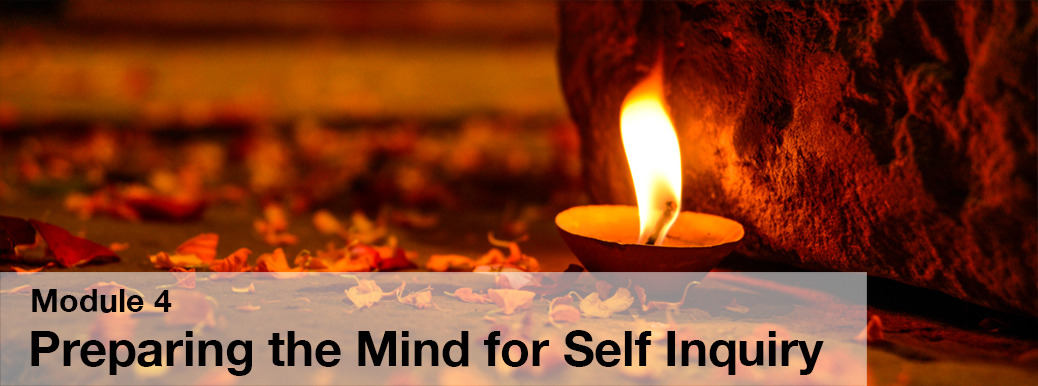Introduction
Dama is the second sub-qualification of Discipline. Dama means tranquility and mastery of the sense organs. In short; sensory discipline.
In this sub-module we will discuss:
1. How sense organs distract the mind?
2. Why mastery of sense organs is essential?
3. How to practise Dama?
4. Why discipline is required in all activities?
Sense Organs Distract The Mind
Whereas Shama is the restraining of the mind, Dama is the restraining of sense organs. All the 5 sense organs i.e. eyes, ears, nose, touch and the tongue have a propensity to get attached to certain objects.
The tongue can have a craving for a certain taste, for e.g. a craving for sweets. If you don’t get to eat sweets for some time, you miss them. Your mind craves for them and your tongue craves for their taste.
Similarly the faculty of touch can crave a certain touch, the ears can crave for a certain sound and so on.
The habitual craving of these sense organs causes them to indulge in these sense pleasures again and again. Dama is the bringing back of these sense organs from their cravings and focusing the mind back on our Vedantic study.
Mastery Of Sense Organs Is Essential For Vedantic Study
Mastery of the mind is necessary so that the mind, sense organs and the body are available for the pursuit of study.
Many times when I want to focus my mind, I see that my own sense organs distract me.
I want my ears with me on my task, but they go to listen to a sound elsewhere. I want my eyes with me, but they want to see something else. When my eyes and ears go to something, my mind automatically follows.
My tongue starts craving for the sweet I ate yesterday. I long for a remembered touch from the past. All these are distractions.
These habitual cravings of sense organs pull my mind away from my focus. We want a mind that can focus when we’re studying or reflecting on Vedanta.
Lord Krishna in the Bhagavad Gita compares the sense objects to a powerful wind that diverts a boat away from its path.
Therefore for a serious student it’s essential to have control over the mind and sense organs.
Restraining Does Not Mean Repressing
All Vedanta says is that we should be able to focus on what we want to do without getting distracted. We should be the master of our mind and sense organs, and not the other way around. We should not be a slave to our senses.
Only when sense organs distract us, should the issue of control and restraint come in.
Practising Dama
Let’s see how to practice Dama with one sense organ – the tongue. The tongue has two functions; speech and taste.
At the level of speech, Dama means discipline or austerity of speech. In Bhagavad Gita, Lord Krishna describes austerity of speech as:
Speech, which does not cause agitation, which is true, pleasing, and beneficial, and the daily repetition of one’s own Veda are (collectively) called discipline of speech.
Lord Krishna gives us three criteria for speech:
1. My words should not hurt anybody.
2. I must be truthful.
3. My speech should be pleasant and useful.
While speaking we say many things that are not useful, so it’s necessary to limit our speaking. When we speak too much without thinking, we can inadvertently hurt somebody. So austerity of speech based on the above 3 criteria will automatically limit our speech.
The tongue has another function; taste. Dama is a sense of proportion with reference to food; in other words, discipline in eating.
I should not eat out of force of habit, or to please my palate, at the expense of my health. I should practice discipline and eat what only what is required, and in the quantity that is required.
Discipline is required in all activities
In Bhagavad Gita, a disciplined person is described as having a sense of proportion in all activities. The person:
1. neither consumes too much or too little food.
2. neither walks or moves too much or too little.
3. sleeps neither too much or too little.
In such a person there is alertness and awareness about every action. This self-awareness brings about discipline. Such a person is an organized person, who does not waste his movements or his faculties. He puts his faculties to proper use.
Thus Dama is discipline in all our activities.
Summary
| 1. | Dama means mastery of the sense organs. |
| 2. | All 5 sense organs have a propensity to get attached to certain objects. The habitual craving of the sense organs towards the sense pleasures distract the mind. |
| 3. | Mastery of the mind and sense organs is essential for Vedantic study. If sense organs constantly distract us then Self-Inquiry becomes that much more difficult. |
| 4. | Restraining the sense organs does not mean depriving them of all sense organs. It only means that we should control the sense organs and not the other way around. |
| 5. | To practise Dama we should maintain discipline and austerity at the level of each sense organ. Everything should be in balance; neither too much or too little. A disciplined person is alert and aware about every action. Dama is discipline in all activities. |


